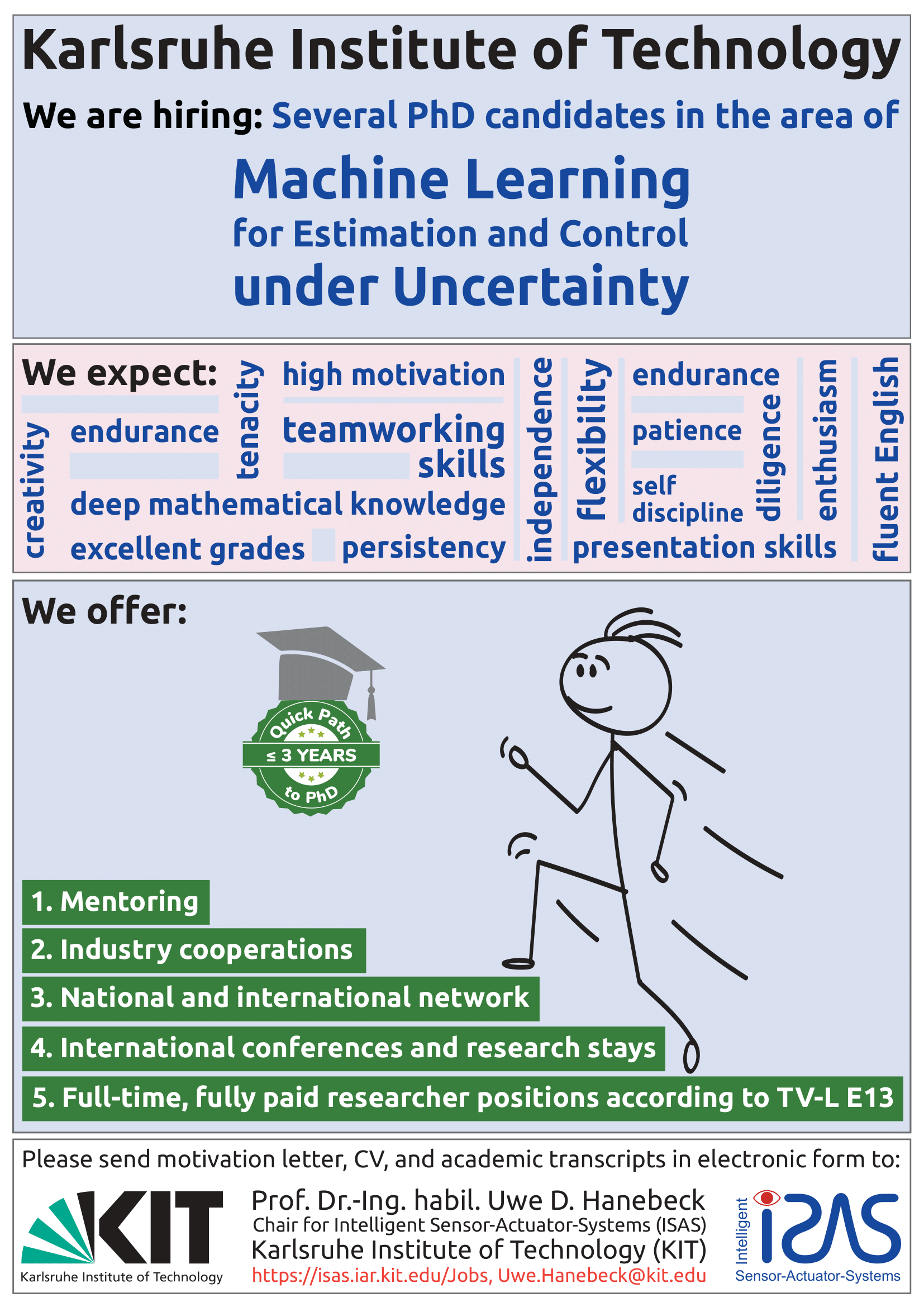Full-time, fully paid PhD/PostDoc positions in “Machine Learning for Estimation and Control under Uncertainty” at the Intelligent Sensor-Actuator-Systems Laboratory (ISAS), Karlsruhe Institute of Technology (KIT), Karlsruhe, Germany
Karlsruhe Institute of Technology (KIT):
KIT combines its three core tasks: research, higher education, and innovation within one mission. With about 9,400 employees and 25,000 students, KIT is one of the biggest institutions of research and higher education in natural sciences and engineering in Europe. KIT is located in Germany in the medium-sized city of Karlsruhe with a very high quality of life.
Chair for Intelligent Sensor-Actuator-Systems (ISAS):
ISAS (https://isas.iar.kit.edu) works on modern machine learning methods for estimation and control with applications to
- Optimization of industrial processes, e.g., optical sorting machines,
- Aircraft localization for air traffic control,
- Development of assistive functions in telepresence systems,
- Sensor data processing in distibuted networks, e.g., industrial process automation and monitoring,
- Measuring, processing, and visualizing spatially distributed data in large environments.
Description of Positions:
We are seeking candidates for PhD positions in the following areas:
|
|
|
|
All positions offer the possibility to cooperate with our extensive network of partners from industry and academia on a national and international basis.
We offer intensive mentoring and a quick path to the PhD degree (≤ 3 years). Besides research, the supervision of bachelor/master theses and participation in teaching is expected.
Personal Qualifications:
- Master's degree (or equivalent) or PhD in computer science, electrical engineering, mechanical engineering, mathematics, or a related subject.
- Very good mathematical knowledge.
- Moderate proficiency in programming.
- Know-how in stochastics and signal processing (are advantageous, but not a prerequisite).
- High self-motivation, team working skills, and readiness for interdisciplinary work.
- Proficiency in the English language (spoken and written).
- Commitment to publish research results.
- Willingness to travel internationally (conferences, research stays, ...).
Payment:
The positions are full-time, fully paid researcher positions according to "Vergütungsgruppe des Tarifvertrages des öffentlichen Dienstes" TV-L E 13. This may increase depending on experience.
Contact:
Submit applications including cover letter, CV, academic transcripts, and application code in electronic form to:
Univ.-Prof. Dr.-Ing. habil. Uwe D. Hanebeck
Karlsruhe Institute of Technology (KIT)
Department of Informatics
Institute for Anthropomatics and Robotics (IAR)
Chair for Intelligent Sensor-Actuator-Systems (ISAS)
Adenauerring 2
D-76131 Karlsruhe
Germany
E-Mail: Uwe.Hanebeck∂kit.edu
KIT is pursuing a gender equality policy and encourages women to apply.
Furthermore, in case of equal qualification, preference is given to applicants with disabilities.
| Titel | Art | Ansprechpartner |
|---|---|---|
| High-Quality Deterministic Gaussian Samples | Bachelor-/Masterarbeit |
|
| Entwicklung eines Testverfahrens für Unsicherheitsschätzungen von bayes'schen neuronalen Netzen | Bachelor-/Masterarbeit |
|
| Automatische Kartenregistrierung von Extended Reality Geräten | Bachelor-/Masterarbeit |
|
| Stochastische modellprädiktive Regelung eines optischen Sortierers mit zweidimensionalem Aktorenarray | Masterthesis |
|
| Prototypische Entwicklung eines effizienten Ausschleusesystems für optische Sortierer | Bachelor-/Masterthesis |
|
| Bahnplanung für die kollisionsfreie Mensch-Roboter-Interaktion | Bachelor-/Masterarbeit |
|
| Optimale Sensorplatzierung für die Schätzung von Roboterbewegungen | Bachelor-/Masterarbeit |
|
| Towards Virtual and Augmented Reality with a Sense of Touch | Bachelor-/Masterarbeit |
|
| Kraftschätzung für einen autonomen Hydraulikbagger | Bachelorthesis |
| Title | Job | Contact Person |
|---|---|---|
| Entwicklung einer generischen ROS-Schnittstelle für Dekontaminationsroboter | Hiwi-Stelle |


